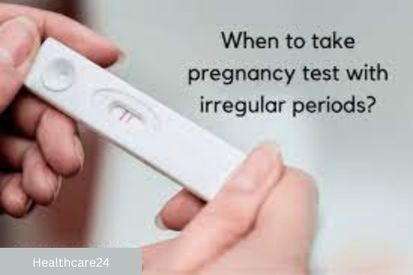Are you experiencing the unpredictability of irregular periods and wondering about the possibility of pregnancy? The journey to conception can be a rollercoaster, especially when your menstrual cycle throws you for a loop. Understanding how pregnancy tests work and the best timing for taking them can provide clarity in this whirlwind of uncertainty. Let’s dive into the realm of confirming pregnancy for irregular periods and explore alternative options for those navigating this unique challenge.
Contents
- 1 Understanding Irregular Periods
- 2 How Pregnancy Tests Work
- 3 Factors That Affect the Accuracy of Pregnancy Tests
- 4 When to Take a Pregnancy Test for Irregular Periods
- 5 Alternative Ways to Confirm Pregnancy for Irregular Periods
- 6 Medical Options for Women with Irregular Periods Trying to Conceive
- 7 Conclusion
Understanding Irregular Periods
Pregnancy for Irregular periods can be a frustrating puzzle for many women, causing stress and confusion when trying to conceive. These cycles don’t adhere to the typical 28-day pattern, making it harder to predict ovulation and fertile windows accurately. Factors like hormonal imbalances, stress, weight fluctuations, and underlying health conditions can all contribute to irregularities in your menstrual cycle.
Tracking your periods with a calendar or app can help identify patterns or irregularities over time. Pay attention to changes in flow, duration, and symptoms that might indicate an underlying issue requiring medical attention. Consulting with a healthcare provider is crucial if you notice persistent irregularities or experience other concerning symptoms alongside your period disruptions.
Understanding the nuances of pregnancy for irregular periods is critical to managing your reproductive health effectively and optimizing your chances of conceiving when dealing with this challenging aspect of fertility.
How Pregnancy Tests Work
Pregnancy tests work by detecting a hormone called human chorionic gonadotropin (hCG) in urine or blood. The placenta produces this hormone after a fertilized egg attaches to the uterine lining.
Most home pregnancy tests are designed to be simple and user-friendly. They typically involve either urinating on a stick or dipping it into a cup of urine. The test then detects hCG levels, providing results within minutes.
Blood tests at a healthcare provider’s office can also detect hCG levels but are usually reserved for specific cases, like early detection or monitoring of high-risk pregnancies.
The accuracy of pregnancy tests depends on various factors, such as how well instructions are followed and when the test is taken relative to ovulation and implantation. It’s essential to read the instructions carefully and consult with a healthcare provider if there are doubts about the results obtained from home tests.
Factors That Affect the Accuracy of Pregnancy Tests
Pregnancy tests are designed to detect the presence of a hormone called hCG in urine or blood. However, their accuracy can be influenced by various factors. One significant factor is the timing of the test. Taking a test too early may result in a false negative, as hCG levels may not be high enough to be detected.
Another factor is the quality of the pregnancy test itself. Using an expired or faulty test can lead to inaccurate results. Additionally, certain medications like fertility drugs or even common painkillers can interfere with the accuracy of pregnancy tests.
Furthermore, diluting urine by drinking excessive fluids before taking a test can also affect its reliability. Following the instructions carefully and using first-morning urine is essential for optimal results. Stress and underlying medical conditions like polycystic ovary syndrome (PCOS) or thyroid disorders can also affect the accuracy of pregnancy tests.
When to Take a Pregnancy Test for Irregular Periods
Pregnancy for Irregular periods can make it challenging to pinpoint the best time to take a pregnancy test. Since ovulation and menstruation patterns vary, traditional methods might not apply. In such cases, tracking your cycle becomes crucial.
Pregnancy For irregular periods, consider taking a pregnancy test around three weeks after unprotected intercourse or when you notice early pregnancy symptoms like nausea or breast tenderness. This timing helps ensure accurate results while accounting for potential ovulation fluctuations.
Remember that hormone levels can differ significantly among individuals with irregular cycles, affecting the accuracy of at-home tests. Opt for a blood test at your healthcare provider’s office for more reliable results.
Staying attuned to your body’s signals and seeking professional guidance can lead to more precise insights into confirming pregnancy for irregular period challenges.
Alternative Ways to Confirm Pregnancy for Irregular Periods
Navigating the journey of confirming pregnancy for irregular periods can be challenging. If traditional pregnancy tests are inconclusive due to irregular cycles, alternative methods may provide clarity.
One option is tracking basal body temperature (BBT), which can indicate ovulation and potential pregnancy. A sustained increase in BBT could suggest conception has occurred.
Another method is monitoring cervical mucus changes throughout the menstrual cycle. Changes in consistency and color can offer insights into fertility and potential implantation.
Additionally, using ovulation predictor kits to detect hormonal surges before ovulation may help pinpoint the most fertile days for intercourse.
Exploring these alternative ways to confirm pregnancy for irregular periods can provide valuable information when traditional methods fall short. It’s essential to consult with a healthcare provider for personalized guidance on the best approach for your unique situation.
Medical Options for Women with Irregular Periods Trying to Conceive
Pregnancy for irregular periods trying to conceive, and seeking medical guidance can provide valuable options. One common approach is tracking ovulation through methods like basal body temperature charting or ovulation predictor kits. These tools help pinpoint the most fertile days in a woman’s cycle.
In cases where hormonal imbalances are causing irregular periods, medications such as Clomid may be prescribed to stimulate ovulation. This medication can help regulate the menstrual cycle and increase the chances of conception.
In more complex cases, healthcare professionals may recommend fertility treatments like intrauterine insemination (IUI) or in vitro. These procedures assist in facilitating pregnancy for women facing challenges due to irregular periods.
It’s essential for women with irregular periods who are struggling to conceive to consult with a reproductive endocrinologist or fertility specialist. They can provide personalized treatment plans tailored to individual needs and increase the likelihood of achieving pregnancy successfully.
Conclusion
For women with irregular periods trying to confirm pregnancy, it’s essential to understand the factors that can affect the accuracy of pregnancy tests. While traditional urine-based tests may not always provide reliable results due to hormonal fluctuations, alternative methods, such as blood tests and ultrasound scans, can offer more definitive answers.
Additionally, seeking medical guidance from a healthcare provider is crucial for women with irregular periods who are trying to conceive. Fertility specialists can provide personalized advice and treatment options tailored to individual needs, increasing the chances of successful conception.
Remember, every woman’s body is unique, and what works for one may not work for another. Patience and persistence are essential when navigating the journey of confirming pregnancy with irregular periods. Stay informed, stay proactive, and don’t hesitate to seek professional help when needed.
Read More…..
White discharge during pregnancy
Morning Sickness in Early Pregnancy: Nausea During Pregnancy





